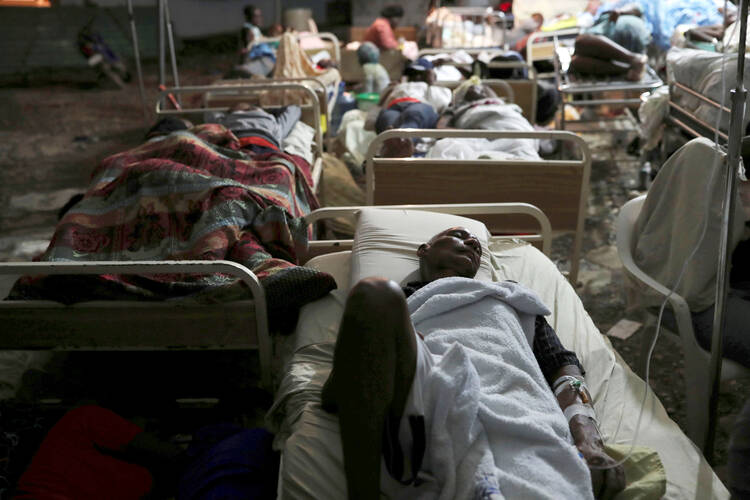A 5.9-magnitude earthquake rocked the Caribbean nation of Haiti Oct. 6, with authorities estimating 15 dead and 333 injured, the Associated Press reports.
Port-De-Paix, the northern city where the earthquake hit, is an isolated area and one of the poorest parts of the country, according to Beth Carroll, head of programs for Catholic Relief Services in Haiti.
“One big concern is health services,” Ms. Carroll told America. “They weren’t good before the earthquake and the general hospital, which already needed to be rebuilt, has sustained some damage.”
Fear of the hospital collapsing has led staff to put patients outside. Since the initial quake, Haiti was hit by a 5.2-magnitude aftershock Sunday and thousands have dragged their mattresses out of their crumbling cinderblock homes.
“One big concern is health services. They weren’t good before the earthquake and the general hospital, which already needed to be rebuilt, has sustained some damage.”
Haitians are still traumatized by the 7.0-magnitude earthquake that hit just outside Port-au-Prince in 2010, Ms. Carroll said. More than 200,000 died during the “goudou-goudou,” as Haitians came to describe the quake and its aftershocks.
Families in Haiti tend to have little in cash savings, so any interruption to their work lives can take a toll, Ms. Carroll said. Medical costs and homes repairs will complicate tight family budgets. Children may drop out of school and earn whatever money they can if their parents are injured or their homes are damaged.
“The situation in Haiti is tragic,” Eric LeCompte, executive director of Jubilee USA Network, told America. “It’s the poorest country in the hemisphere and one of the poorest in the world.”
Mr. LeCompte, a finance expert, said Haiti’s ongoing struggles stem from a weak infrastructure that is vulnerable to natural disasters, like earthquakes and hurricanes. While Jubilee USA facilitated the forgiveness of Haiti’s debt after the 2010 earthquake, the country again finds itself in a financial hole. Its national debt tops $2.6 billion.
“The situation in Haiti, coupled with natural disasters, leaves the people with a sense of hopelessness,” Mr. LeCompte said. “That’s where it’s incumbent on the international community to step in. For Christians, it’s a moral issue.”
But while it seems insurmountable, Mr. LeCompte believes the international community can invest in the nation’s infrastructure, which will be less expensive to build in Haiti. The ongoing problems with corruption, however, will require greater accountability and transparency, he said.
“The situation in Haiti, coupled with natural disasters, leaves the people with a sense of hopelessness. That’s where it’s incumbent on the international community to step in."
Art Brouillard and some of his fellow parishioners from All Saints Church in Mesa, Ariz., traveled to Haiti after the 2010 earthquake. They were so moved that he, his wife, Bea, and Deacon Bernie Filzen founded the nonprofit Action By Christians for Haiti.
ABC for Haiti has been partnering with a parish outside of Hinche, a town in central Haiti. Through their partnership with Our Lady of the Rosary, they began by establishing a clean water supply to the surrounding community.
“The water has been pretty much taken care of now, so now we’re working on education,” Mr. Brouillard told America. They are supporting teachers and maintenance at the parochial elementary school and established sewing classes for both men and women on the church grounds. They are also paying for continuing education in auto mechanics, cabinet making and clothing.
Mr. Brouillard said it is common for people in the area to eat only once a day. Some have so little to eat that they resort to consuming paddies made by mixing oil with clay from the ground, which has some minerals.
“If a crumb of food drops to the ground, they eat it. They aren’t worried about germs,” he said. Mr. Brouillard said the parish was unaffected by the earthquake.
“They’re really not progressing much,” he said of Haiti over the last eight years.
Those who are in hospitals in rural areas have to rely on friends or family members to bring them food, he said. Hospital staff will not administer any treatment that cannot be paid for.
More than 46,000 Haitians in the United States received temporary protected status after the 2010 earthquake. T.P.S. protects them from deportation and enables them to acquire work permits.
The Department of Homeland Security ended T.P.S. for Haitians last year, giving them until July 22, 2019 to leave the United States. But on Oct. 3, a federal judge blocked cancellation of T.P.S. for Haitians and other recipients from El Salvador, Nicaragua and Sudan. It is unclear how the Oct. 6 earthquake will impact T.P.S. holders.











The prior comments reflect the press coverage - nonexistent, irrelevant, and on a different topic.
The prior comments reflect the press coverage - nonexistent, irrelevant, and on a different topic.